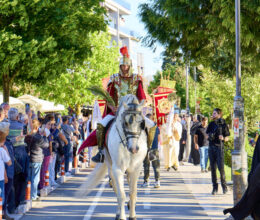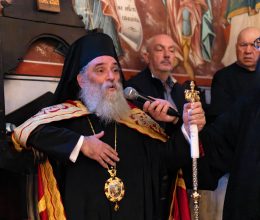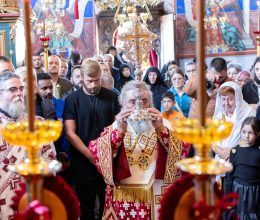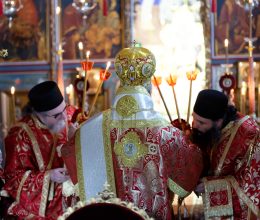Homily by His Grace Bishop Partenij of Antania, delivered during the Divine Liturgy on the Feast of the Holy Great-Martyr George the Trophy-Bearer in Rajchica, on May 6th, 2023, the Year of the Lord
Beloved,
We have gathered today in liturgical assembly in this holy temple, to glorify with one voice and heart the Holy Great-Martyr George the Trophy-Bearer—one of the most renowned confessors and martyrs, a faithful witness to the truth of our Orthodox Christian faith, a saint beloved and venerated throughout the entire Christian world.
Through His glorious Resurrection and Ascension into the heavens, God bestowed upon man an inexpressible dignity. And Saint George, together with all the saints, is a living confirmation of that dignity—of that exaltation of the human race into the heavenly reality. For after the Ascension of our Lord Jesus Christ, Who out of love for mankind took flesh from the Most Holy Virgin and became one of us, He sits at the right hand of God the Father, as we confess in the Symbol of Faith. As God, He is everywhere present and fills all things, but as man, He also sits bodily at the right hand of the Father. While He was still on earth, He was one with the Father, yet by becoming man He assumed everything that is human, except sin, and thus He raised our body—our humanity—into eternal glory. The Body of Christ, now glorified, is seated there, so that the God-man Jesus Christ is the firstborn from the dead, the way and the gate to eternal life. Therefore, all of us, through Him and in Him, are saved, and through Him the Kingdom of Heaven is fulfilled. He is the Head, and the saints—among whom Saint George shines with a particular brilliance—are members of that living body which forms the heavenly assembly of those who have been well-pleasing to God.
Before the Resurrection of Christ, the souls of men, even the spirits of the righteous, were in a state of sorrow, of expectation—they were as though asleep, estranged from the fullness of life. Death reigned everywhere. But with His glorious Resurrection, the Lord Jesus Christ called forth all those souls from the darkness. He descended with His immortal soul, united with the Divinity, into the depths of Hades and called from there the prophets, the righteous; He opened the royal gates of the spiritual, heavenly realm and granted them access to the light, to communion with God. He fulfilled precisely that which is the purpose of every human being: to commune with God, to become one with God, to become a deified being in Christ Jesus. This is the ultimate goal of human existence—not merely to believe, but to be united with the One Who created him.
Saint George and all the saints are testimony to this theosis, to this mystery of salvation. They are not merely virtuous people, but the fruit of Christ’s work. For if there were no saints, if there were no living witnesses to Christ’s Resurrection, then the Gospel would remain but a lofty idea, a beautiful theory, yet without witnesses and without confirmation in practice. But the Church lives through the saints. The Lord, in His divine wisdom, arranged it so: from the very beginning, He made His disciples eyewitnesses of the Resurrection. They not only saw Him risen, but touched Him, conversed with Him, ate with Him—they perceived Him both bodily and spiritually—and afterward, with the descent of the Holy Spirit, they were transformed into fearless preachers and witnesses of this truth.

This truth does not cease. It is not a one-time event. It lives in the Church even today, and has lived for two thousand years. Countless are the witnesses—like Saint George, like the martyrs, like the confessors, like the venerable ones. And every Christian who is baptized in the name of Jesus Christ bears within himself that same immortality; he carries that same grace-filled potential to be a witness of the Resurrection—through his life, through faith, through love, through patience.
We may freely say—and that with deep conviction—that Christians differ from the adherents of all other religions in the world, not out of pride, but by gift. For when we enter the Church, we do not come merely to believe, but to be deified. Through the Holy Eucharist, through Holy Communion, we receive the very Lord of glory—not as an idea, not as an abstraction, not as a memory, but in His true Body and Blood. And thus, we are no longer merely believers—we are lovers of God. We commune with Him; we become one with Him. That is why the Lord Jesus Christ, in His Holy Gospel, did not only say: “Believe in God,” but commanded: “Love God.” For love is the fullness of faith. Love opens the spiritual eyes. And through love, we shall come to know God, to see God. In the Church, that mystery takes place. God is not distant; He is near, tangible, perceivable. We feel Him, we see Him, we carry Him within us. This is the truth that the Church of Christ lives by. In other religions, there is only talk of belief, of human faith directed toward a lofty principle. But in Christianity, that belief is transformed into a living communion, into a mystical and personal union with the living God. That is why our faith, beloved, is not merely a doctrine, not merely morality. Our faith is love for the Person of Christ. It is life in Christ and for Christ. That is true life.
Such was the love for Christ possessed by today’s glorious celebrant, Saint George. It is no secret that he endured immeasurable torments, yet he did not waver—he did not renounce his Lord. What was it that bore him through those merciless martyrdoms? It was love. Love that despises all that is false in this world—even death itself. Love that does not spare its own life, if it be for the sake of the Beloved. Saint George, in the end, gave his life—but for whom? For the One Whom he loved with all his soul—for Christ.

Saint George loved Christ with his entire being. He felt Him, he carried Him in his heart, he lived with Him. He was a Christian not only in name, but in essence. From a young age, he was raised in the light of Christ’s faith. As we learn from his Life, his mother was a woman of deep piety. With her quiet faith and motherly love, she planted the gentle seed of the Gospel in young George’s heart. And that seed not only did not wither, but sprouted and grew into a tree of holiness, which today casts its shade over the whole world. That which a mother or a grandmother plants in the heart of a child, brothers and sisters, cannot easily be uprooted. That first prayer, that first icon, that first cross the child lays eyes on—these remain. Therefore, you Orthodox mothers and grandmothers bear a great and holy responsibility. Everything begins with you. It depends on you whether the fear of God or the fear of the world, faith or unbelief, light or darkness will be planted in the heart of the child. We all share in this responsibility, but those who raise, who teach, who stand first before children must above all commune with God themselves, must know Christ, must love Him. For only God, only Christ, can transform a person from within. He alone can make one a new creation. And not merely a good person, for the goal of Christianity is not simply that we become good and humane. The goal of our faith is far greater, far more exalted: to become gods by grace. To be deified. To become one with God. To live what He Himself lived. For the Lord Himself promised us: “He who follows Me, who takes up My Cross, shall do even greater works than these which I have done.” And we know that Christ performed countless miracles; some of them are written in the Holy Gospel, others are not written there, but are known to the Church and her sacred Tradition.
Behold, beloved, Saint George continues to work wonders in the name of Christ—countless and ineffable. There is no place, no church in the world where his name is not known, where his intercession is not felt. The saint, with his boldness before Christ, is continually sent by God to help all who call upon him with faith and honor his sacred memory. Even here, in this holy monastery, even today, Saint George is working miracles. In these recent days, a woman of Islamic faith came, originally from Debar but now living abroad. She had been suffering from serious health problems. She was brought here by Orthodox believers from Debar. With faith and patience, she waited for us to complete the construction of the spring, so that she could be the first to draw water from it. And indeed, when she filled her bottle and returned home, she drank—and a miracle occurred. The Saint healed her. Thus, he confirms the truth of the faith and shows that God does not look upon outward appearance, but upon the heart.
Therefore, as Christians, we are called to bear the cross that is given to us in life. Not with grumbling, but with humility, with love, with patience. For only the cross leads us to the resurrection. Only the cross makes the person a new creation. All the saints—like Saint George, like the venerable ones—fought and struggled, for we all bear a cross in this world, we all endure temptations, we all engage in battle. And who is our greatest enemy? It is not man, but the spirit of this world—the worldly spirit—which seeks to separate us from Christ, which seeks to persuade us to be merely “good” in a human sense, but not deified in God. Someone may ask: must we then hate the world? No. We Christians are those who love the world most—but not sin; rather, creation. We love people, nature, animals—everything that the Lord created in love. But we do not love the evil that has nestled itself within the world, we do not love the sin that enslaves us, we do not give ourselves over to personal comfort.
Today, unfortunately, people live selfishly. They want everything to be easy, pleasant, comfortable, secure—even at the cost of injustice. Everyone today seeks only how to pass more easily through life. How to have more comfort, more pleasure, more taste. How to somehow “slip” into life, to find a comfortable place, without sacrifice, without ascetic struggle. And even when that path is dishonest, even when it tramples one’s neighbor, they press on—just to reach what the world considers to be “security,” “success,” a “guaranteed life.” Such have the societies of today become. And from this comes the great crisis. But where is the greatest crisis, truly? Not where there is no faith at all, but precisely within the Christian world. The world that ought to bear witness to Christ, to be a new creation in Christ, the world that throughout the centuries built civilizations adorned with beauty, with art, with exalted thought—this world is now in crisis. And we all feel it. All of Europe, the entire Christian civilization has weakened. Why? Because people have abandoned Christ. They have abandoned the Cross. But a man without the Cross cannot truly live. People today do not wish to suffer, they do not wish to sacrifice—they seek only comfort. But without the Cross there is no resurrection. Without Christ, everything becomes tasteless, everything becomes a shadow. Therefore, it is no wonder that the world is at a dead end—for it has distanced itself from the One Who is the Way, the Truth, and the Life. Where there is no sacrifice, there is no true life. Christ calls us to the Cross, not to comfort. “Whoever does not take up his cross and follow Me is not worthy of Me,” says the Lord. The Cross is life. And everyone—even the one who thinks he can escape it—will in the end receive his cross. But let that cross be a blessed one. Let it be for repentance. Let it lead us to transformation. For the cross that we bear in humility leads us to resurrection, to ascension.

A humble and blessed bearer of the cross was also Saint George. When the time came for him to bear witness to Christ, he did not waver. Even though he was great and honored in this world—a military tribune, favored by the emperor, a victor in battles—he forsook it all. He renounced it. For he knew that all earthly glory is but a shadow. He knew that it is not the earthly, but the heavenly homeland that is eternal. And there he departed, and from there he now helps us. Even today, he shines brightly for us. Saint George shines for the entire world. He shines with the light of Christ. May he help us, through his holy prayers, that we too may become good Christians and ascetics. Amen.
Christ is Risen!















